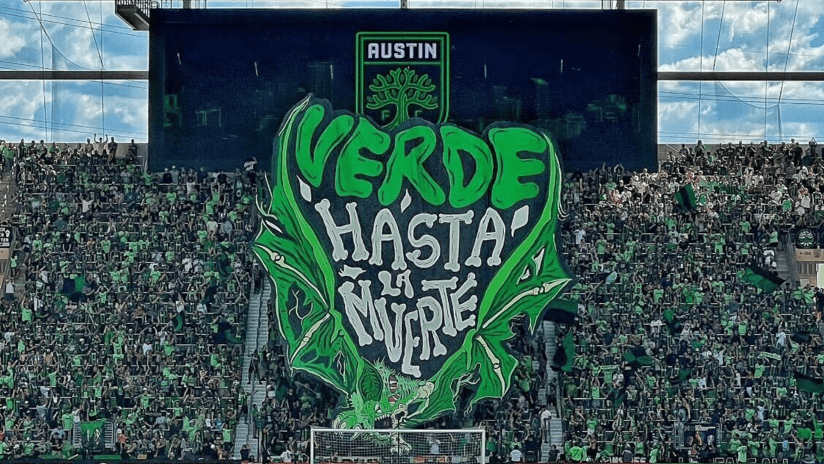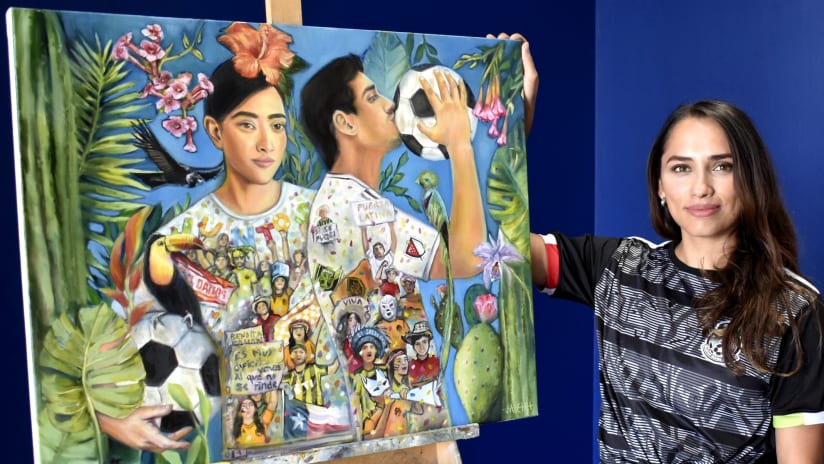For Hispanic Heritage Month, Portland Timbers legend and MLS Season Pass analyst Diego Valeri devotes his “Lectura de Juego” column to reflect on his experiences as an Argentine immigrant living in the United States over the past 12-plus years.
You can read his column in Spanish here.
It’s seven in the morning. It’s cloudy in Portland, as usual. Sundays are greyer than other days. Whenever my routine allows, I sleep until noon. The time change from the East Coast is exhausting. The United States is wider than it is long, and after taking so many red-eye flights, I’ve gotten used to nights with three hours of sleep while traveling in the air at 800 kilometers per hour.
I go into the kitchen and the mate is prepared. Although Florencia, my wife, doesn’t travel with me she still sleeps less than I do. Not only has she already had breakfast, she’s also on the treadmill. I look out the window and see a baseball in our backyard. It belongs to the neighbor. I sit down. There’s a book by Osvaldo Soriano, Una sombra ya pronto serás (You’ll soon be a shadow), on top of the table. The water sinks into the yerba right as the vapor rises in the air.
I don’t like to sit, I save my efforts at being still when traveling on planes. So I get up, leave the book on the table, stick the thermos under my arm and start walking. I open the door that leads to the backyard and throw the ball over the fence, aiming for the cornhole some 15 meters away. I miss. The cold gets to me so I go back inside.
I gaze over the furniture and see a picture of me with my daughter, Connie, in my arms. That picture was taken after a game, while I was doing an interview at the Timbers’ stadium. She looks happy, not shy at all in front of the camera. It makes sense: she’s had one in her hand practically since birth, pointing it to save images and moments that still seem to escape us.
In fact, these days she’s very different from the “Connie” in that picture… Except for the sparkle in her eyes that, God willing, the world never takes away from her. I’m not sure I’ve thought enough about the decision to come to the United States with my family from our native Lanús. I also don’t know whether I needed to think it over too much. Maybe I guessed everything would turn out how I imagined it would and, within that mind frame, I didn’t take into account the risks, the passage of time, the contact with this new world. That’s the thing about idealizations: they generally distance us from reality and, on occasion, distance us from people.

I remember Connie’s godmother came with us to Portland when we first arrived, that rainy month in January 2013. She was an English teacher and, since none of us spoke fluently, she came along to help us get settled in. Connie was three years old.
In my first season with the Timbers, we spent 15 days in the desert in Tuscon. I roomed with Will Johnson, a teammate who arrived in Portland during the same transfer window as me. He was going to be the new captain. Many times he’d sit on his bed to read and we’d spend hours in silence. I was unsure about talking because he was always serious, but I felt the need to speak to him. So, a little embarrassed, I used the minimal English vocabulary that I'd learned in high school and from watching Hollywood movies. It worked. Not so much because he understood what I was saying, but because speaking with someone, even with gestures, opens your mind. It allows you to get to know the other person and find out how much you have in common. Will told me he was born in Canada, grew up in Liverpool and then lived in Chicago. He played two years in the Netherlands and had come from Utah after playing for Real Salt Lake. “A nice mix,” I thought. Football also helps us share our lifestyles.
One of the peculiarities a footballer goes through when leaving their country is that the locker room becomes a family and your teammates become brothers. I’m not a fan of numerology, but I’m 100% convinced that in the past 12 years, I’ve shared more meals with Diego Chara than with my actual brothers or even my mother. Breakfasts and lunches during training, preseason dinners, away games, international tournaments, and birthdays for family members or friends. In those get-togethers, I discovered pineapple empanadas and paisa platters. With all due respect for “Charita” and my Colombian brothers, I have to say I still prefer asados and Argentine meat empanadas. I think those moments of sharing and spending time together were crucial to the success and growth of the Portland Timbers. If I can brag about leaving any type of legacy in the locker room, it’s this: contributing what was mine and putting it to use for the good of “us” with arms wide open.

I always brought that culture and that feeling to every country I played in. That way of being became even more pronounced in 2013 when Max Urruti was traded from Toronto to Portland, and the poor guy didn’t know what to do. He’d arrived in Canada a month earlier after being transferred from Newell’s, and his girlfriend was waiting for him in Ontario, with brand-new furniture on the way. But after a game against us, they told him he would be staying with the Timbers. I invited him over to my house and noticed a rosary tattoo on his arm. I told him to join me at mass the next day.
We left early and Maxi didn’t say a word. He didn’t move, not even to do the sign of the cross. He was 22 years old, it was his first time away from Argentina and he was terrified. Later on, he confessed he was too ashamed to tell me that, despite his tattoo, he usually didn't go to mass. But, given the circumstances, it wasn’t a bad idea to seek help from “the Man upstairs.” We laughed about that anecdote when lifting MLS Cup in 2015, knowing that he would be joining FC Dallas.

When I stop looking at Connie’s picture, she enters the kitchen to eat breakfast. She asks me for a bagel with cream cheese and orange juice. I cut up an apple to give her some fruit as well. I offer her mate, she shakes her head no and gives me a look of disgust. ‘Do you remember that day?’ I ask her and point to the picture. ‘Yes, I loved being on the field after games and lifting the logs with confetti from the supporters raining down on us.’ We smile. She talks on the phone, in English, sending voice messages to her friend Stephanie. I barely understand anything they’re saying because they speak so fast, it’s like they’re speaking twice the normal speed. I realize it’s my problem since I learned the language as an adult and, as much as I try, my ears don’t respond the same way. I still think in Spanish.
One day Connie came home from kindergarten and asked me: ‘How are you, daddy?’ I cried tears of joy. Lately, I’ve been shedding some tears because she doesn’t understand my “Argento” sense of humor. I know it’s a kind of selfish suffering. My career brought us to this part of the world, so I shouldn’t complain. It’s just that the future worries me as much as all that’s in the past. I’ve been like that ever since she was born. Maybe having some doubts helps liven up the present while longing for the future.
I offer her mate again. Nothing. She then tells me she’s been accepted into a program at Portland State University to get some early credits before college. She’s a sophomore in high school, three years away from college. She says that to get accepted, she wrote an essay explaining why she’s known as “Connie” here despite her legal name being “Costanza.” During her 15 years, some spent living in Buenos Aires, she’s very Argentinian for Americans but very “Gringa” for Argentines. I congratulate her with a hug and she goes to her room to continue talking with her friend.
One of the things I most like about North America is the development of sports along with education. Sports have always been a serious thing in my life: that’s how it was for us in South America, and it seems to be the same in the opposite hemisphere, although with its nuances. Where I grew up, not everyone has parents who allow them to develop both things. I did. Thanks to my parents I was able to become a footballer and, at the same time, understand the value of an education. I was already a professional in high school, but my parents still forced me to finish my studies. Little by little, football took me to places around the world I never imagined I’d see.
During the pandemic my father got Covid. Thousands of kilometers away, speaking on video chat, he told me his stomach hurt but he thought he’d get better soon. I was with the Timbers, about to play a Concacaf Champions Cup game in Honduras. He wished me luck before I left for the stadium. When the game ended, I went to the locker room and saw thousands of messages from my brother: my father was dying in an intensive care unit in Buenos Aires. I couldn’t travel to see him. Even in Argentina, almost nobody was allowed inside the hospital rooms. He died after a few days. I remember those weeks in Portland, looking up at the sky above the pine trees, thinking about the things I’d meant to tell him, about the true meaning of “heritage” and the pixelated image of his face during that last talk we had before they put him under on the way to the hospital.

As a professional athlete, I lost as much as I gained. That said, I consider myself lucky to have played football at a high level for 20 years. Luck shapes your destiny as much as hard work does. Occasionally I get asked if I was superstitious during my playing days. When I tell them no, they look at me with shock and suspicion. So they ask again: ‘You didn’t have a ritual heading to the game or in the locker room?’ I say ‘no’ once again, but clarify that I’d do the sign of the cross before and after the game. I add that another possible ritual is after waking up every morning, I do the sign of the cross, open the curtains and look up at the sky. Maybe it’s because I feel that every day I’m playing for something. Something that transcends today.
I take a last sip: the mate has lost its flavor. Crows get near the window. Their shadows are less dark than their feathers and lighter. They fly between the pine trees, I lose sight of them quickly. No chance to say goodbye.













